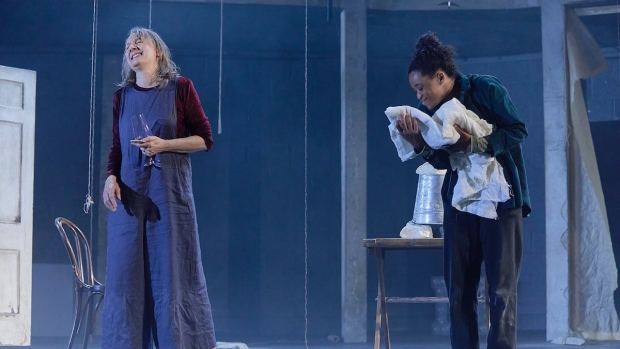The Seven Pomegranate Seeds review – densely poetic, modern-day retellings of Euripides' heroines
The production runs at the Rose Theatre in Kingston

© The Other Richard
What an intriguing yet intractable play this is! It doesn't necessarily achieve all its aims, but watching it is a good deal more interesting than watching a lot of more formally successful dramas.
Colin Teevan's transposition of the heroines of Euripides to modern-day settings began life as a monologue on the radio and has undergone a radical transformation into a play for two actors – Niamh Cusack and Shannon Hayes – after conversations with the director and designer Melly Still.
Still has filled the stage and the auditorium with skeins of string, a spider's web of connection and control within which the individual stories of mothers and children unfold in language that is densely poetic but also direct. Sometimes the poetry seems unearned: Medea's reaction on learning about the death of her children feels as over-wrought as Macbeth's speech on finding Duncan's body. But most of the time it is robust and effective.
Medea, in a reworked tale of domestic annihilation where she is more victim than perpetrator, is one of the women we encounter in contemporary settings. The over-arching myth is the tale of Persephone and Demeter, the mother and daughter separated when Persephone is snatched into the Underworld. That act of violence becomes symbolic here, a murder and a rape that destroys life and meaning.
Other re-transfigured women are less familiar and their tales are wrenched into new meaning. Hypsipyle becomes a teenaged babysitter stranded in Washington, Creusa a woman forced to give her child up for adoption, and Alcestis, the wife of a rich and ailing restaurateur who is saved from death after her act of generosity by the intervention of James Bond.
It's quite hard, if you don't know all the stories intimately, to savour the richness of the retellings: I've done quite a lot of reading up to find out exactly who some of the originals were. The production helps by finding different ways of showing us their names – Persephone is embroidered on an apron, Hypsipyle chalked on the stage – but it isn't quite enough.
Nevertheless, the action holds the attention and is helped by Still's production which – with the aid of Jon Nicholls' sound and Malcolm Rippeth's lighting – makes the most of its barebone effects, conjuring a range of scenes with very little. I particularly liked the way that after each story has finished, the protagonists cut the string that is holding one of seven stones suspended from the ceiling, and it plonks, satisfyingly, to the floor.
Switching between roles, embodying men, women and even children, both Cusack and Hayes are riveting too, their command of the verse matched by an easy-shape shifting into different parts. Hayes is particularly wonderful as Persephone, with a kind of child-like wildness; Cusack is both sinister (as Medea's male tormentor) and compelling, as this compendium of love and loss tugs us towards its meaning.













